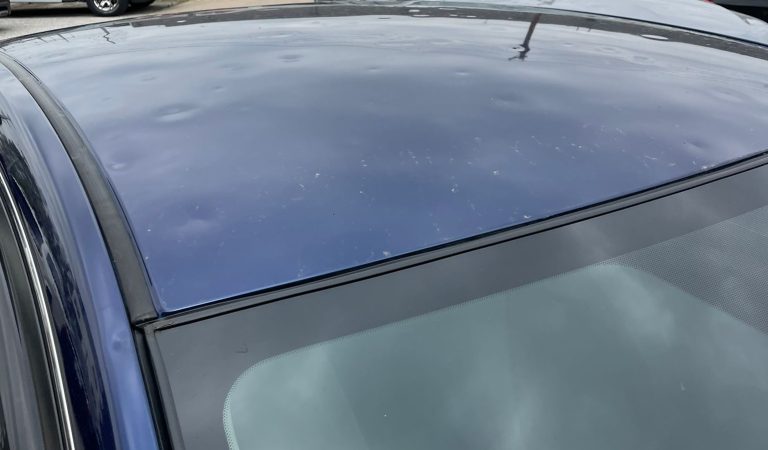Should I Claim Hail Damage on My Car?

Hailstorms can cause significant damage to your car, leaving dents, dings and broken windows. If you live in Texas, you may be wondering if you should claim hail damage on your car insurance and how it will affect your rates. Here are some factors to consider before filing a claim.
Understanding Hail Damage
Before we delve into the decision-making process, let’s first understand what hail damage entails. Hailstones can range in size from small pebbles to large golf balls, and when they collide with your vehicle, they can cause dents, scratches, cracked windshields, and even more severe damage. The extent of the damage will depend on the size of the hailstones, the force of impact, and the type of vehicle.
Does Car Insurance Cover Hail Damage?
The answer depends on what type of coverage you have on your policy. If you have comprehensive insurance, you are covered for hail damage. Comprehensive insurance pays to repair or replace your car if it’s damaged by severe weather, fire, theft, vandalism, animal collisions or falling objects. It’s an optional coverage that you have to pay extra for, but it may be required by your lender if you have a loan or lease on your car.
If you only have liability insurance, which is the minimum required by law in Texas, you are not covered for hail damage. Liability insurance only pays for the injuries and property damage you cause to others in an accident. It does not cover your own car or injuries.
Is It Worth Making an Insurance Claim for Hail Damage? Factors to Consider
Severity of the Damage
One of the primary factors to consider when deciding whether to claim hail damage on your car is the severity of the damage. If your vehicle has only a few minor dents that don’t affect its appearance or functionality, you might choose to pay for the repairs out of pocket. However, if the damage is significant and affects the vehicle’s value or safety, filing an insurance claim becomes a more viable option.
Insurance Deductible
Another crucial aspect to evaluate is your insurance deductible. The deductible is the amount you’re required to pay out of pocket before your insurance coverage kicks in. If the cost of repairing the hail damage is lower than your deductible, it might be more economical to handle the repairs yourself. However, if the damage exceeds your deductible, filing a claim can help cover the expenses.
For example, if your deductible is $500 and the repair cost is $1,000, you will pay $500 and your insurance will pay $500. If the repair cost is less than your deductible, your insurance will not pay anything.
if the damage is severe and the repair cost is much higher than your deductible, it may be worth making a claim to save money and restore your car’s value.
Future Insurance Rates
It’s essential to consider the potential impact on your future insurance rates when deciding whether to claim hail damage. Most insurance companies view hail damage claims as “acts of nature” and do not penalize policyholders for filing them. However, a few insurers may increase your rates if you have multiple claims in a short period of time on your policy. It’s advisable to review your insurance policy or consult with your insurance agent to understand how a hail damage claim might affect your premiums.
How Do I File an Insurance Claim for Hail Damage?
Conclusion
Hail damage can be frustrating and costly, but it can be covered by comprehensive insurance if you have it on your policy.
Ultimately, the decision of whether to claim hail damage on your car depends on the specific circumstances and your preferences. If the damage is extensive, poses safety risks, and exceeds your deductible, filing an insurance claim is generally the best course of action.
Frequently Asked Questions (FAQs)
How long do I have to file a hail damage claim?
The timeframe to file a hail damage claim varies depending on your insurance company and policy. It’s crucial to check your insurance policy or contact your insurance provider promptly after the hailstorm to ensure you don’t miss the filing deadline.
Can I choose my repair shop when filing a hail damage claim?
In most cases, you have the freedom to choose the repair shop for hail damage repairs. However, some insurance policies have preferred repair networks or require you to use specific shops for certain benefits or warranties. Review your policy or consult with your insurance provider to understand the options available to you.
What if I don't repair the hail damage on my car?
While it may be tempting to forgo repairs for minor hail damage, it’s generally not recommended. Leaving the damage unrepaired can potentially lead to further issues, such as rust or compromised structural integrity. Additionally, if you plan to sell or trade in your vehicle in the future, the hail damage can significantly decrease its value.
We can fix it for $0 out-of-pocket and we pay your deductible.
Request a free hail damage assessment
This site is protected by reCAPTCHA and the Google Privacy Policy and Terms of Service apply.
